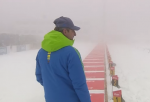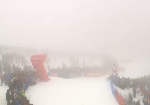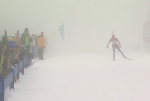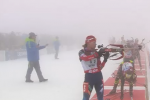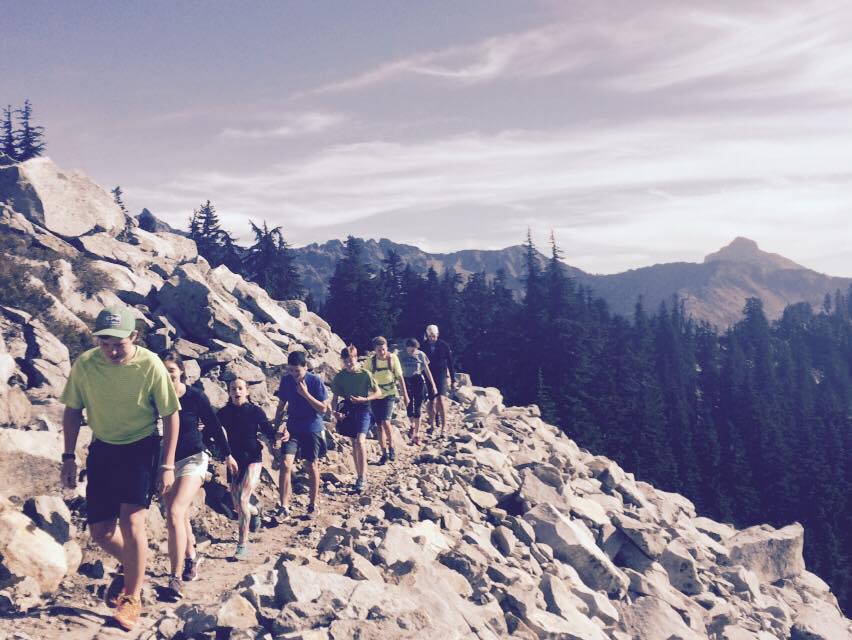
For the North Americans, Sunday’s 4 x 6 k women’s biathlon relay started off well in Antholz, Italy.
Susan Dunklee of the United States left her standing stage on the scramble leg in second place. Rosanna Crawford was eighth, just 12 seconds from the lead. Dunklee handed off to Annelies Cook, who was in fifth when she came to her own standing stage; Megan Imrie, who had taken over for Crawford, was in eighth.
But all at once, the fog that had been lingering on the flanks of the surrounding mountains tumbled down into the Antholz stadium, obscuring everything. The first time the competitors noticed it was about a kilometer from the stadium, when all of a sudden they were skiing through thick, thick fog.
Then they arrived on the range.
“My first coping strategy was to shoot as fast as possible, as the targets would barely be visible,” said Megan Imrie.
Her idea: if she was going to miss a lot of targets anyway, might as well get it over with.
Ekaterina Shumilova of Russia was the first woman to arrive. She got into position, looked through her rifle’s sight, and then looked up, double checking the targets. She looked through her sight again. She looked up and looked straight down the range, trying to discern where the targets were.
Meanwhile, Anais Bescond of France and Andrea Henkel of Germany skied into the range, then Elisa Gasparin of Switzerland. Cook and Teja Gregorin of Slovenia arrived next.
“There was no chance to see the targets,” Cook wrote in an e-mail.
Henkel was the first to get a shot off. It was a miss.
Inernational Biathlon Union officials canceled the race, telling the women not to try to shoot.
“When I arrived in the range a minute later, everyone was standing on their shooting mats, and the officials were telling us not to shoot,” Imrie explained. “But it was a good decision at the time. There were no targets to speak of, we were staring into a white cloud. There was nothing to aim at.”
For the Canadian women, it was a tough pill to swallow. Earlier this season in Annency, France, they had had a career-best finish: fourth place. All of a sudden they knew what was possible, and were in a position where they just might realize such a finish again.
“I was just itching to finish the race,” Imrie said. “Rosanna had done a great job, our skis were blistering fast, and my teammates were chomping at the bit. Our entire team has had a much different lead up to these races than the European’s. We are rested and fit, so it was a huge disappointment to have yet another race cancelled.”
Another frustration for the Canadians was that Audrey Vaillancourt had traveled to Antholz from Ruhpolding, Germany, where she was competing on the IBU Cup. Megan Heinicke was sick, so Vaillancourt was to replace her after finishing 31st in the IBU Cup sprint on Saturday. But Vaillancourt turned out to have skipped the IBU Cup pursuit for nothing, as she never even raced in the relay.
“It’s at least reassuring to be feeling strong,” Imrie said. “Now the next task is to carry it into Sochi.”
The women’s pursuit in Östersund, Sweden, was also canceled earlier this season, that time for very high winds. In all, the women’s World Cup season has been significantly disrupted already. While the men’s race was also canceled in Sweden, in Antholz on Sunday the men were able to start their relay with a 30-minute delay after the fog cleared and turned to snow. It wasn’t necessarily fun conditions for them, but racing was at least possible.
Cook agreed with Imrie’s sentiments.
“That was a bummer,” she wrote of the cancellation. “It was good for me to end on a positive note anyways, but of course I would have liked to finish my race and also cheer my teammates on.”
Cook, who has been plagued by shooting trouble in individual races, had raced a strong leg so far: she had left prone in seventh but skied her way up to fifth.
“I was with a group of strong skiers like Andrea [Henkel],” she wrote. “It was great for me to feel like I was skiing with them but feeling really relaxed. It’s been a tough season so far and that was really good for my confidence.”
Despite the frustration of not being able to finish, Cook was able to find some humor and fun in the situation.
“It was a pretty funny day,” she wrote. “I always kind of like it when conditions are crazy because everyone relaxes a bit and remembers that biathlon is just a game.”
Chelsea Little
Chelsea Little is FasterSkier's Editor-At-Large. A former racer at Ford Sayre, Dartmouth College and the Craftsbury Green Racing Project, she is a PhD candidate in aquatic ecology in the @Altermatt_lab at Eawag, the Swiss Federal Institute of Aquatic Science and Technology in Zurich, Switzerland. You can follow her on twitter @ChelskiLittle.

